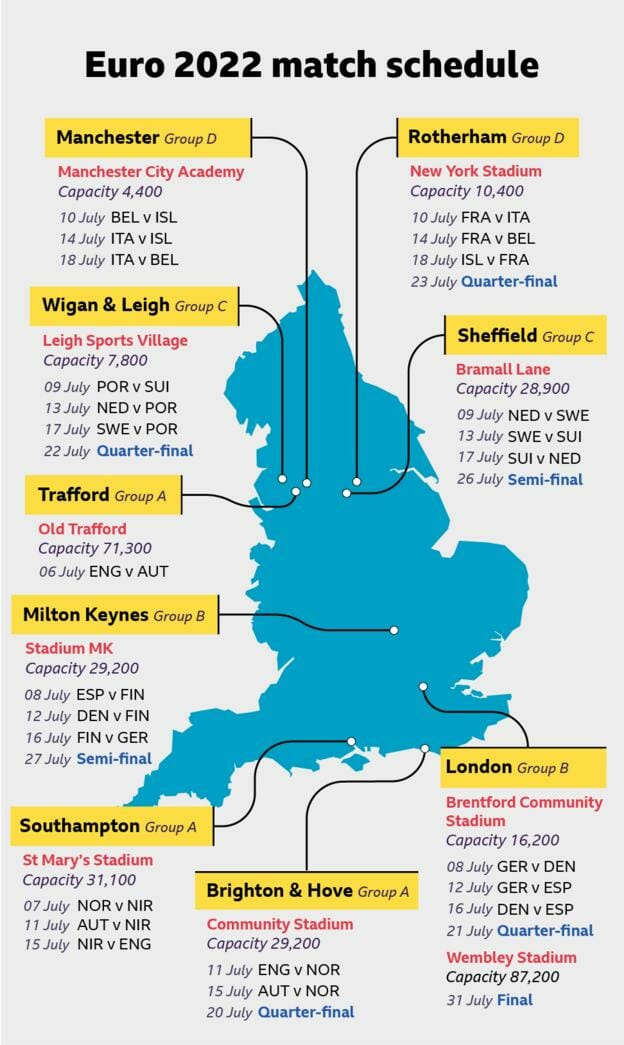
There can’t be many players with eight Champions League trophies, 14 league titles and more than 130 international caps who have played in Rotherham – let alone playing three group-stage games of a major international tournament there.
But that is exactly what will happen when France’s Wendie Renard – one of the most decorated players in women’s club football – captains Les Bleues in their opening Euro 2022 match against Italy at Rotherham’s New York Stadium on Sunday, which has a 10,400 capacity for the tournament.
Against the backdrop of a debate about the size and profile of some of the grounds chosen to host the Euros, Leigh Sports Village – which holds 7,800 for the showpiece – hosts defending champions the Netherlands, featuring superstars including Paris St-Germain’s Lieke Martens and Arsenal striker Vivianne Miedema.
However, 68,871 fans watched hosts England beat Austria 1-0 in Wednesday’s opening game at Old Trafford, setting a new record for the European Women’s Championship.
And with 500,000 tickets already sold for the tournament – more than double the amount for the Euros in 2017 – does it matter?
In April, Iceland midfielder Sara Bjork Gunnarsdottir said it was “embarrassing”, “shocking” and “disrespectful” that her country would face Belgium and Italy at the Manchester City Academy Stadium, which has a capacity of 4,400 for the Euros.
“It’s disrespectful towards women’s football because it’s so much bigger than people think,” Gunnarsdottir said. “You think women’s football is getting two steps ahead, but when something comes up like that it’s just a step back.”
What do other players think?
Chelsea and England forward Beth England is from Barnsley, and says it will mean the world for communities in places like Rotherham and Leigh, where international football is rarely played.
“People from up north have not always got the capacity to travel to where we’re going,” she told BBC Sport.
“Many fans probably can’t afford to travel that far, so with a stadium closer to them it means they’re able to attend a women’s game which they might not have before.
“It’s a home Euros and there should be a wide spread of locations for people to attend. I think it’s really inclusive for the whole country.”
Club and country team-mate Jess Carter thinks football, and this tournament, should be for fans around the nation.
“If we don’t go and play there, how are they going to have an opportunity to see us?” said Carter.
“Of course we want big crowds, but we’re trying to inspire a whole generation, a whole country – not just big cities where you see football day-to-day.”

What is the background to this debate?
In June, Football Association chief executive Mark Bullingham said the venues for the tournament were chosen in 2019.
“The absolute truth of it is we did a tender process throughout every major ground and city in the country, and there were very few that came forward in wanting to host the women’s Euros,” he said.
“We actually had to persuade a few clubs and cities to come forward, so we are very happy with where we got to.”
Baroness Sue Campbell, the FA’s director of women’s football, told BBC Sport: “To start with, you have to ask people to want to be part of this. Places like Sheffield and Rotherham said yes, then they have to meet Uefa regulations which meant some clubs didn’t make the journey with us.”
“We wanted a balance. The capacity we’ve got for tickets is around 725,000, and we’ve sold 450,000 [now 500,000]. If we had sold 750,000 we could have done bigger stadiums, but we haven’t. So did we get the balance right? We think so.”
Baroness Campbell added that there is a long-term goal for the FA at the centre of this debate.
“Our legacy plans and work to increase the number of people participating as players, coaches, volunteers and referees has also been focused on those areas. We see them as real hot-spots now,” she said.
“We want every young girl who wants to play our game to have that opportunity. So we want to reach every community and every youngster.”







